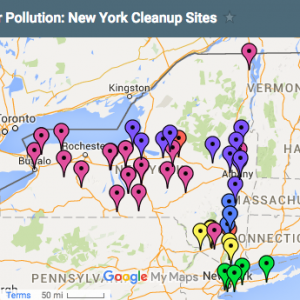Michigan Supreme Court Decision in Au Sable River Case Shores Up Protection for Environment
An environmental group’s legal victory to block contaminated dumping into a popular fly-fishing stream sets precedent to protect Michigan waters from pollution.
By Steve Kellman
Circle of Blue
By siding with the Anglers of the Au Sable in a long-running lawsuit over a state permit that threatened the celebrated trout stream, the Michigan Supreme Court has strengthened protection of all state waters in the process, according to lead attorney Jim Olson.
The dispute began in 2005, when the Michigan Department of Environmental Quality (DEQ) gave Houston-based Merit Energy a permit to discharge up to 1.15 million gallons of treated wastewater from a contaminated site into a creek that flows into the Au Sable River. The discharge plan was part of Merit Energy’s plan to clean up a former Shell Oil production facility in the Manistee River watershed.
Anglers of the Au Sable—a 600-member environmental conservation group—mounted a legal campaign to block the move, arguing that it threatened the river’s health and amounted to a massive diversion of water from one watershed to another.
While early court rulings favored the Anglers, a state appeals court ruling dismissed the DEQ (now the Department of Natural Resources and Environment) from the suit.
But on December 29, a narrow 4-3 majority of the court rendered its verdict, ruling that Merit Energy’s discharge plan was “manifestly unreasonable” and that the DEQ should be held accountable for violating the Michigan Environmental Protection Act.
In the process, the court overruled a previous decision from the 2004 case of Preserve the Dunes v. DEQ, which let the state environmental agency off the hook for permitting a sand mining operation on nationally protected dunes.
Traverse City-based environmental attorney Jim Olson, who specializes in water rights, represented Anglers of the Au Sable in the recently decided case and spoke with Circle of Blue about the outcome.
Olson called the decision “very important” and “crucial to maintaining the value and use of property rights, as well as the value and use of the state’s lakes, rivers, and streams.”
“The public and private property owners won in this case,” he said.
The court decision also set a precedent that state waters should be protected as a public trust, rather than the less rigorous concept of a “reasonable use balancing test,” which had been used in a previous lawsuit, Michigan Citizens for Water Conservation v. Nestlé Waters North America. In that 2007 case, the court ruled with the bottled water giant, which planned to pump millions of gallons annually from a Mecosta County aquifer.
Olson thinks the decision in the Au Sable case will help overturn the precedent set in the Nestlé Waters case, less than three years earlier.
“The use of the balancing test is very dangerous,” Olson told Circle of Blue. “It puts a price tag on water…Property rights would be reduced to political science and economic decisions.”
The decision also helps restore the rights of Michigan citizens to sue the state under the Michigan Environmental Protection Act of 1970. The court’s now-overturned ruling in the Preserve the Dunes case had exempted DEQ permit decisions from the threat of citizen lawsuits—a right enshrined in the state’s 1970 legislation.
The December 29 decision restored the ability of any Michigan citizen to sue the state over environmental harm, including in cases where the harm was caused by a DEQ permit decision.
The decision may be short-lived, however.
Supreme Court Justice Alton Thomas Davis, who wrote the majority opinion in the Anglers decision, had been appointed to the state’s top court in August. Davis was filling the last four months of Justice Elizabeth Weaver’s term after her resignation. The term expired days after the court issued its opinion on the Anglers case, and Republican-backed Mary Beth Kelly has since taken the seat.
The three judges who voted against the December 29 decision signed on to a scathingly worded dissent—authored by Judge Robert P. Young Jr.—calling the lead opinion “extraordinarily lawless and profoundly dangerous” and warning that overturning the Preserve the Dunes ruling will “wreak havoc on this state’s legal system.” Judges Maura Corrigan and Stephen Markman signed the dissent.
The dissenters also argued that the case should have been dismissed in June 2010, when Merit Energy had abandoned its cleanup plans and submitted a new plan that did not involve dumping water into the Au Sable.
Steve Kellman is a Traverse City-based reporter for Circle of Blue. Reach Kellman at circleofblue.org/contact.
All three opinions—lead, partially concurring, and dissenting—can be found in this document.
Sources: Bloomberg, Michigan Messenger, Traverse City Record-Eagle
Read more on Circle of Blue: Michigan Supreme Court Case Could Strengthen Protection of State’s Lakes, Streams and Groundwater











Thank you for covering this important decision, Steve and Circle of Blue. First, I would add two things. While the makeup of the Court has changed, this case was fully briefed, argued before the bench orally, and resulted in majority decision by the State’s highest court. Under rules of law and precedent, especially cases involving decisions over riparian property rights and water rights and uses by citizens, subsequent Justices, regardless of their political ideology, generally respect such a decision. Hopefully, the new Justices with the remaining five who heard and deliberated the case, will put the integrity of the judiciary and respect for rule of law above points of view. Second, while the water involved in the case is subject to a public trust, the decision in the Angler’s case did not involve a claimed violation of public trust. It involved water as a commons, common to all riparian owners against outside interests and common to citizens, and that is why the refusal to put a price tag for exports of water above the rights of private and public users of our lakes and streams, including the Great Lakes, is so important.
Then the next day this happened:
Action Needed Now (28 January 2011)
Michigan Supreme Court to Reconsider Kolke Creek Case Just Weeks After Ruling in Favor of Anglers ? We Need To Tell Governor Snyder to Not Play Party Politics With Supreme Court
The other shoe has dropped.
Those of us aware of the Kolke Creek ruling by the Michigan Supreme Court and the results of the 2010 Elections saw this coming. We sure did not have to wait long.
The new Attorney General, Bill Schuette, made it clear that the Kolke Creek case needed to be reviewed. By the very next day, January 19th to be exact, the paperwork was submitted to the appropriate sources. Merit Energy LLC and the Michigan Department of Environment, Natural Resources, and Agriculture had asked the Court to reconsider the decision. An amicus brief was also submitted on behalf of the Michigan Manufactures Association.
The parties are headed back to court on February 1st for a hearing on the merits of reconsideration.
How did this happen so quickly?
Recent elections and Gubernatorial appointments have swung the court to a more conservative view. As a result most who are familiar with the new set of Supreme Court Justices see the court now likely to rule 4-3 in favor of the defendants as well as against the recent reconsiderations of water law.
A reversal of the Kolke Creek case might mean the following:
? Merit Energy would have the legal right to return to the State for easements and a permit to discharge wastewater into the river. This is somewhat unlikely since the oil and gas company has removed the pipeline in question and sought other means of remediation.
? It would overturn the recent ruling stating that conservation groups can protect Michigan?s natural resources from permit decisions that would facilitate environmental harm. This stemmed from the Preserve the Dunes v. Department of Environmental Quality case where the Supreme Court (2004) and the Court of Appeals (2006) ruled that citizens could not bring citizen suits against the MDEQ for issuing permits authorizing harm to the air, water and natural resources. Only actual harm to the environment could trigger this Michigan Environmental Protection Act (MEPA) statute according to these two rulings.
? It would also overturn the Court?s overruling of the 2007 decision in Michigan Citizens for Water Conservation v. Nestle. In that case, the Court held that a MEPA action could not be brought unless the plaintiff could show that it had access to and use of the resource that was being damaged. This severely limited the public’s ability to protect natural resources in this State. The most recent decision by the Court’s restores the public’s rights to sue under MEPA to what they were prior to 2007.
? It could unravel another outcome nested in these far reaching set of decisions. That is a reaffirmation of Michigan law that establishes a clear line on discharges to water bodies like the one proposed by Merit. Furthermore, the Court refused to apply the “reasonable use” balancing test that the Nestle court relied on. Instead, the Court noted that an unreasonable use of water has never been deemed an allowable use and held that Merit’s discharge is not an allowable use of water because it is manifestly unreasonable. All that could change with a reversal.
Anglers believes the decisions rendered in the Kolke Creek case are based upon issues that were thoroughly litigated. There are no sound reasons for a revision or even reconsideration so soon after such a review. This smacks of nothing more than partisan politics.
Traditionally, only judges remaining on the bench who heard the original appeal will listen to the rehearing. If this tradition is followed then like-minded judges Kelly, Hathaway and Cavanagh (likely to uphold the case) will hear the case with Young and Markman (likely to rehear the matter and dismiss the appeal as moot). If tradition is followed then we should win at rehearing. However, if the new Judges Mary Beth Kelly and Brian Zahra (both conservative) participate in the rehearing then Anglers’ recent opinion may be in jeopardy.
The fact of the matter is that there should be no rehearing at all. They should not be playing partisan politics with the Michigan Supreme Court.
We need your help on this. Please call or email Governor Rick Snyder (517-373-3400/Rick.Snyder@michigan.gov) and Attorney General Bill Schuette (517-373-1110/miag@michigan.gov) and tell them that you are disappointed that the Attorney General has moved for rehearing. Tell the Governor and the Attorney General that their actions are not going unnoticed. Overturning the Anglers hard fought victory will diminish the effectiveness of Michigan?s Environmental Protection Act (MEPA), limit an individuals standing to protect water rights and ultimately make it more difficult to protect Michigan Lakes and Rivers. Act Now!
Bruce Pregler, President, Anglers of the Au Sable